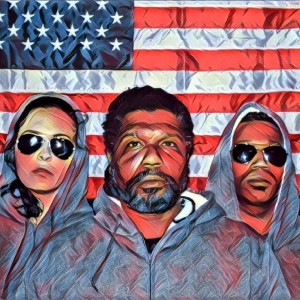By the end of the talk back following the Friday night performance of New and Dangerous Ideas, it became abundantly clear that the audience members who were convinced they understood the content of the play still had a long way to go on the path of enlightenment.
Race is a tricky subject. Conversations about identity and culture can quickly become uncomfortable, especially from the vantage point of privilege. However, in a social climate of division and racial scapegoating, a play like New and Dangerous Ideas is the perfect device to start meaningful dialogue and to provoke change in long-held worldviews.
Christopher Johnson’s New and Dangerous Ideas, despite what you may have heard (or read) is not a controversial play. It does not strike too close to home. It is not in-your-face, nor does it go too far. It’s a mirror; it’s the truth. It’s an hour-long meditation on the systematic injustices that people of color suffer every day in the United States from the perspective of the victims themselves. If that’s cause for you to take offense, you need to take a long, hard look at what type of human being you are.
 The show is a collection of poems, monologues, skits, videos and Facebook messages that amount to a constantly engaging experience. There isn’t a dramatic arc in New and Dangerous in the traditional sense, but the variety of content keeps the story fresh. You never quite know what’s going to happen next. At one point, two actors don whiteface and perform what is ostensibly a reverse minstrel show, detailing five stories of white privilege in the face of the law. The actors then remove the whiteface makeup and tell the stories again, only this time the races are reversed, and the outcome is tragically different.
The show is a collection of poems, monologues, skits, videos and Facebook messages that amount to a constantly engaging experience. There isn’t a dramatic arc in New and Dangerous in the traditional sense, but the variety of content keeps the story fresh. You never quite know what’s going to happen next. At one point, two actors don whiteface and perform what is ostensibly a reverse minstrel show, detailing five stories of white privilege in the face of the law. The actors then remove the whiteface makeup and tell the stories again, only this time the races are reversed, and the outcome is tragically different.
The set is spare and minimal and creates an atmosphere of possibility. Cinderblocks line the perimeter of the stage and cryptic messages are scrawled all over the black walls of the space. You get the sense you’re in Christopher Johnson’s head, the writings of a prophet all around you.
It’s a fitting backdrop to a play that is fundamentally about the words. There are big moments of theatricality, sure, but a lot of this show involves listening and absorbing the details — particularly of the monologues.
The cast is up to the task of navigating this tense subject matter, on their own and as an ensemble. Phoenyx Williams has the audience in the palm of his hand as he recounts an encounter with police. Sarah Leach is similarly captivating in a monologue about wrestling with caucasian identity (being white, but not white enough). And holding the reigns, Christopher Johnson sets the pace of the play, culminating with an intense, mesmerizing poem in which he affirms, “I don’t think all white men are devils/ Just the ones who turn Black boys into angels.”
The talk back following the show is an integral part of the experience. There’s no shortage of opinions after a play like New and Dangerous, and the talk back provides a chance for a very homogenous audience to engage in conversation about race, which they might not be provided with in their lives otherwise.
The content of this play shouldn’t startle anyone. If this show makes you upset, or uncomfortable, it is likely a major red flag as to your own white privilege. Maybe we have an idea that we come to the theater to relax, maybe to be taken on a journey, like reading a good book.
Nah, son.
Theater should challenge you. Theater should cause you to confront the limits of your comfort zone. New and Dangerous Ideas isn’t a play in the traditional sense, but it’s a good piece of theater, and a necessary one in these turbulent times.
If you want Rogers and Hammerstein or Neil Simon when you come to the theater, that’s fine. You deserve to be entertained with something familiar and comfortable.
But I want plays that are different. I want plays that are new and dangerous.
More Posts by The Author:
The Odeum gets Epic: Epic Love Stories Premieres in East Greenwich
Your Guide to Local Holiday Theater
A Newcomers Guide to Local Theater
Around the Edges: FringePVD 2016
Maudern Love: 2nd Story’s Harold and Maude


